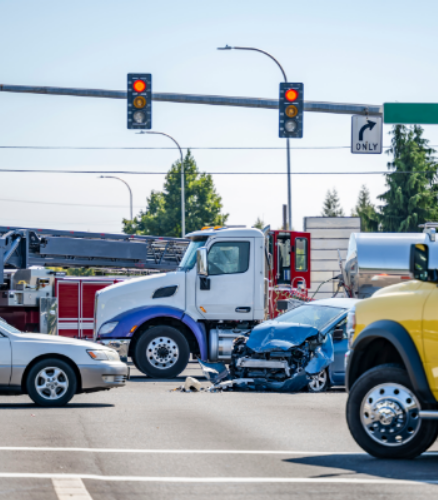

When involved in a truck accident in Seattle, one might wonder about the possibility of suing for pain and suffering. This type of lawsuit falls under personal injury law, which aims to compensate individuals who have suffered harm due to another's negligence or intentional actions. truck accident lawyer Seattle . In Washington State, the legal basis for suing for pain and suffering after a truck accident involves several crucial elements that must be established.
First and foremost, it is imperative to demonstrate that the truck driver or another party was negligent. Negligence is defined as the failure to exercise reasonable care, resulting in harm to another person. For example, if a truck driver was speeding, distracted by their phone, or driving under the influence of alcohol or drugs at the time of the accident, these actions could be considered negligent.
To build a strong case for negligence, you would typically need evidence such as police reports, witness statements, traffic camera footage, and possibly expert testimony. Medical records are also essential as they document the extent of your injuries and can help establish a direct link between the accident and your pain and suffering.
Once negligence is proven, the next step is to quantify your damages. Pain and suffering fall under non-economic damages-those that do not have a specific dollar amount attached but significantly impact your quality of life. These can include physical pain, emotional distress, loss of enjoyment of life, anxiety, depression, and more. Assessing non-economic damages can be complex; courts often consider factors like the severity of injuries, length of recovery time, impact on daily activities and relationships when determining an appropriate compensation amount.
In Washington State specifically, there are no caps on non-economic damages in personal injury cases. This means that there is no statutory limit on how much you can recover for pain and suffering. However, it's important to note that Washington follows pure comparative fault rules. If you are found partially responsible for the accident-for instance if you were speeding or failed to signal-a percentage will be assigned to your level of fault. Your total compensation will then be reduced by this percentage.
For example: If you are awarded $100,000 in damages but found 20% at fault for the accident because you were slightly exceeding speed limits at the time of collision with a negligent truck driver; your compensation would be reduced by 20%, leaving you with $80,000.
Given these complexities surrounding personal injury claims related to trucking accidents-such as determining liability among multiple parties (e.g., trucking companies), navigating insurance policies-it is advisable to consult with an experienced personal injury attorney based in Seattle who specializes in trucking accidents. They can guide you through each step-from gathering necessary evidence proving negligence all way up till negotiating settlements ensuring fair compensation reflecting true extent damage done inclusive both economic & non-economic losses experienced post-accident ordeal including ongoing medical treatments required long-term care needs arising thereof impacting overall lifestyle adversely affected due incident occurred unintentionally yet avoidably had proper precautions taken initially preventing mishap altogether ideally speaking hypothetically though realistically possible implementing safety measures rigorously enforced industry-wide standards universally accepted reducing risk significantly benefiting society collectively ultimately safeguarding individual interests concurrently harmoniously balanced equitably justifiably sustainably maintained consistently over time enduringly perpetually ideally aspiring towards achieving optimal outcomes envisioned proactively envisaged responsibly managed effectively efficiently ethically transparently collaboratively cooperatively positively contributing constructively productively fostering healthy environments conducive thriving communities resilient robust adaptable future-proofed against unforeseen adversities contingencies uncertainties inevitable challenges faced inevitably encountered unpredictably navigated successfully overcoming obstacles barriers impediments hindrances obstructing progress advancement forward
When considering the aftermath of a truck accident in Seattle, the concept of pain and suffering compensation often emerges as a critical factor for victims seeking justice. These types of damages are intended to address not only the physical injuries sustained but also the emotional and psychological toll that such accidents can impart. Understanding the factors that influence pain and suffering compensation is crucial for anyone contemplating legal action.
First and foremost, the severity of the injury plays a significant role in determining compensation. Minor injuries such as bruises or small cuts typically result in lower compensation compared to more severe injuries like broken bones, spinal cord damage, or traumatic brain injuries. The extent to which these injuries disrupt daily life, requiring long-term medical treatment or resulting in permanent disabilities, further amplifies their impact on compensation amounts.
Another key factor is the duration of recovery. Injuries that heal within weeks might warrant less compensation compared to those necessitating months or even years of rehabilitation. Chronic pain conditions arising from truck accident injuries can also be a critical consideration; they contribute significantly to ongoing suffering and thus may justify higher compensatory amounts.
The emotional and psychological impact cannot be overlooked when assessing pain and suffering. Many victims experience anxiety, depression, post-traumatic stress disorder (PTSD), and other mental health issues following a traumatic event like a truck accident. The mental anguish endured can sometimes surpass physical pain in its severity and longevity, thereby justifying substantial compensatory claims.
A victim's age and general health prior to the accident are also pertinent factors. Younger individuals or those who were previously healthy may have their life trajectories drastically altered by their newfound limitations. Conversely, older individuals or those with pre-existing conditions might receive different assessments regarding how much their quality of life has been affected.
Moreover, jurisdictional specifics play a role in determining compensation for pain and suffering. In Seattle, Washington state law does not impose caps on non-economic damages (which include pain and suffering). This means there is potentially more flexibility in what one might claim compared to states with stringent limits on such awards.
The credibility of evidence presented is another vital component influencing compensation outcomes. Medical records detailing injury severity, psychiatric evaluations outlining mental health impacts, personal testimony describing daily struggles-all these pieces collectively shape an effective claim for pain and suffering damages.
Furthermore, insurance companies often employ various algorithms to estimate appropriate settlements based on comparable cases. However, these calculations might undervalue individual experiences since they rely heavily on data rather than personal narratives.
In conclusion, suing for pain and suffering after a truck accident in Seattle involves navigating through multiple influencing factors including injury severity, recovery duration, emotional impact, pre-accident health status, local laws concerning damages caps (or lack thereof), evidentiary support strength, among others. Each element builds upon another to create a compelling case aimed at achieving fair restitution for enduring hardships caused by such unfortunate incidents.
When navigating the aftermath of a truck accident in Seattle, it's crucial to understand the intricacies of finalizing settlements and deciding whether to accept an offer or pursue further legal action.. This decision can significantly impact the compensation you ultimately receive, and having a seasoned Seattle truck accident lawyer by your side can make all the difference. Truck accidents are often more complex than typical car accidents due to factors such as the severity of injuries, higher potential for property damage, and multiple parties that could be held liable.

Posted by on 2024-09-16
Choosing the right truck accident lawyer in Seattle can be a daunting task, especially when you're dealing with the aftermath of a traumatic event.. The initial consultation is your opportunity to gauge whether a lawyer is the right fit for you.

Posted by on 2024-09-16
Navigating the aftermath of a truck accident can be an overwhelming and complex ordeal.. Amidst medical treatments, emotional turmoil, and potential financial instability, one pivotal aspect stands out: maximizing compensation and securing a fair final settlement.

Posted by on 2024-09-16
When it comes to choosing the best Seattle truck accident lawyer, making the final decision can feel like navigating a labyrinth.. The attorney you select will play a crucial role in your pursuit of justice and compensation, so it's vital to ensure you're making an informed choice.

Posted by on 2024-09-16
Truck accidents are a grim reality on Seattle's bustling roadways.. The sheer size and weight of these vehicles mean that collisions often result in severe injuries, extensive property damage, and tragically, sometimes fatalities.

Posted by on 2024-09-16
Experiencing a truck accident can be an overwhelming and traumatic event, especially on the bustling roads of Seattle. The immediate aftermath is often chaotic, but taking certain steps can significantly impact your ability to pursue legal action for pain and suffering later on. Understanding these steps not only ensures your safety and well-being but also strengthens your potential case if you decide to sue.
First and foremost, prioritize safety. After a truck accident, move to a safe location if possible without worsening any injuries. Turn on your hazard lights to alert other drivers and prevent further collisions. If anyone is injured, call 911 immediately to get medical help on the scene as quickly as possible. Your health is paramount, and getting prompt medical attention also documents any injuries sustained in the accident.
Next, gather information at the scene. This includes exchanging contact details with the truck driver and collecting insurance information. Note down the license plate number of the truck, its make and model, as well as any identifying company logos or marks. Witnesses can provide crucial third-party accounts of what happened; therefore, ask for their names and contact information too.
Photographic evidence is invaluable in these situations. Take clear pictures of all vehicles involved from multiple angles, capturing damages, road conditions, traffic signs, skid marks, weather conditions, and any other relevant factors that might have contributed to the accident. These visual records offer concrete proof that can be highly persuasive in court.
Once you've left the scene of the accident or received medical treatment if necessary, it's important to report the incident to your insurance company promptly. Provide them with accurate details without admitting fault or speculating about what caused the crash; simply stick to factual accounts.
Seattle law allows you to pursue compensation for pain and suffering resulting from a truck accident through a personal injury lawsuit. Pain and suffering encompass both physical pain and emotional distress experienced due to an accident-related injury. However, proving these damages requires thorough documentation and expert testimony.
Medical records play a crucial role here; therefore, continue with follow-up treatments as recommended by healthcare professionals. Keep detailed notes on how your injuries affect your daily life-this could range from mobility issues to emotional strain like anxiety or depression resulting from the trauma of the crash.
Consulting with an experienced personal injury attorney early in this process is strongly advisable. An attorney specializing in truck accidents understands the complexities involved such as federal trucking regulations which might come into play alongside state laws governing personal injury claims in Washington State.
Your attorney will guide you through gathering additional evidence like police reports or obtaining black box data from commercial trucks which contain critical information about vehicle speed or brake usage prior to an accident.
In conclusion, while suing for pain and suffering after a truck accident in Seattle is viable under state law, it necessitates immediate strategic actions post-accident: ensuring safety first; collecting comprehensive evidence at the scene; reporting accurately without admitting fault; seeking ongoing medical care; documenting impacts meticulously; consulting legal expertise promptly-all combined enhance prospects for securing rightful compensation amidst challenging circumstances stemming from such unfortunate events.

Gathering Evidence for Your Case: Can I Sue for Pain and Suffering After a Truck Accident in Seattle?
Experiencing a truck accident can be traumatic, often resulting in significant physical injuries and emotional distress. If you find yourself grappling with the aftermath of such an incident in Seattle, you may wonder if you can sue for pain and suffering. The short answer is yes, but it requires meticulous gathering of evidence to build a compelling case.
The cornerstone of any personal injury lawsuit is evidence. It serves as the foundation upon which your claim rests. In the context of a truck accident, this includes various forms of documentation that collectively paint a comprehensive picture of your ordeal.
First and foremost, medical records are paramount. These documents not only substantiate your injuries but also provide a timeline that links them directly to the accident. Visiting healthcare professionals immediately after the incident ensures that your injuries are documented from the onset. Consistent follow-up treatments further strengthen your claim by showing ongoing suffering and necessary medical interventions.
Equally important are police reports. When law enforcement officers arrive at an accident scene, they conduct preliminary investigations including interviews with involved parties and witnesses, as well as assessments of road conditions and vehicle positions. Obtaining a copy of this report provides an objective account of the incident, which can be invaluable when proving liability.
Photographic evidence also plays a crucial role. Pictures taken immediately after the accident capture details that might otherwise fade with time-damaged vehicles, skid marks on the road, weather conditions, and visible injuries. These images serve as irrefutable evidence when recounting what transpired.
Another critical aspect is witness testimonies. Eyewitnesses can offer unbiased perspectives that corroborate your version of events. Collecting contact information from those willing to testify can fortify your case significantly.
In addition to these tangible forms of evidence, personal documentation should not be underestimated. Keeping a detailed journal chronicling your daily pain levels, emotional state, and how these factors impact your quality of life provides qualitative evidence for non-economic damages like pain and suffering.
Finally, expert testimonies can lend substantial weight to your claim. Medical experts can attest to the severity of your injuries and their long-term implications while accident reconstruction specialists can offer insights into how the collision occurred and who was at fault.
In Seattle specifically, understanding local laws regarding personal injury claims is crucial. Washington State operates under comparative negligence rules, meaning that even if you are partially at fault for the accident, you may still recover damages proportional to your degree of liability. This makes thorough evidence collection all the more essential; every piece could potentially sway the determination of fault in your favor.
In summary, suing for pain and suffering after a truck accident in Seattle involves comprehensive preparation centered around gathering robust evidence. From medical records and police reports to eyewitness accounts and expert testimonies-each element contributes to crafting a persuasive narrative that underscores both liability and impact on your life. With meticulous documentation backed by legal expertise, you stand on firmer ground when seeking justice for the pain you've endured.
If you find yourself in the unfortunate situation of being involved in a truck accident in Seattle, one of the pressing questions you might have is whether you can sue for pain and suffering. Navigating the aftermath of such an incident can be overwhelming, but understanding your legal rights is crucial. Working with a personal injury attorney in Seattle can be instrumental in ensuring that you receive fair compensation for your injuries, including pain and suffering.
Pain and suffering refer to the physical discomfort and emotional distress caused by an injury. Unlike medical bills or lost wages, which are relatively straightforward to quantify, pain and suffering are more subjective. This makes claiming compensation for them particularly challenging without professional legal guidance.
In Washington State, like many other states, you are entitled to seek compensation for pain and suffering if you've been injured due to someone else's negligence. Truck accidents often result in severe injuries given the size and weight of commercial vehicles compared to passenger cars. These injuries can lead not only to significant physical pain but also to emotional trauma, anxiety, depression, and even post-traumatic stress disorder (PTSD).
A qualified personal injury attorney will help you gather the necessary evidence to support your claim. This includes medical records that document your physical injuries as well as testimonies from mental health professionals who can attest to your emotional state following the accident. They will also assist you in collecting eyewitness accounts and expert opinions on how the accident has impacted your life.
Insurance companies often attempt to minimize payouts for pain and suffering claims. Without legal representation, it may be challenging to negotiate a fair settlement on your own. An experienced attorney understands the tactics used by insurance adjusters and knows how to counteract them effectively.
Moreover, a local personal injury attorney familiar with Seattle's legal landscape will know how Washington State laws apply specifically to your case. For example, Washington follows a comparative fault rule which means that if you're found partially responsible for the accident, any awarded damages could be reduced by your percentage of fault. A skilled lawyer will work diligently to ensure that liability is accurately assigned so that your compensation reflects the true extent of your suffering.
In conclusion, while it is possible to sue for pain and suffering after a truck accident in Seattle, doing so successfully requires thorough preparation and an understanding of both medical documentation and legal strategy. Working with a personal injury attorney not only increases your chances of receiving fair compensation but also allows you to focus on healing while they handle the complexities of your case. If you've been injured in a truck accident in Seattle, seeking professional legal assistance is a crucial step towards obtaining justice for the pain and suffering you've endured.
When considering potential outcomes and settlements for a lawsuit involving pain and suffering after a truck accident in Seattle, several critical factors come into play. Suing for pain and suffering is often an essential part of seeking justice and compensation after such a traumatic event. Understanding the legal landscape, the role of evidence, and the negotiation process can help you navigate this challenging journey.
First, it's essential to comprehend what "pain and suffering" entails in legal terms. Pain and suffering encompass both the physical discomfort and emotional distress you endure following an accident. This can include chronic pain, mental anguish, anxiety, depression, loss of enjoyment of life, and more. In Washington State, including Seattle, you have the right to seek compensation for these non-economic damages if another party's negligence caused your injuries.
To build a strong case for pain and suffering damages, robust evidence is crucial. This means documenting everything from medical records detailing your injuries to personal diaries describing your daily struggles with pain or emotional turmoil. Eyewitness accounts can also be valuable in substantiating your claims. Working closely with medical professionals who can testify about the severity of your condition and its impact on your life is often necessary.
The next step involves calculating a fair settlement amount for your pain and suffering. Unlike economic damages like medical bills or lost wages that have clear monetary values, non-economic damages are more subjective. Courts typically use two main methods to determine these amounts: the multiplier method or the per diem approach.
The multiplier method involves multiplying your actual economic damages by a certain number (usually between 1.5 to 5) based on the severity of your pain and suffering. For example, if you incurred $50,000 in medical expenses and lost wages combined, using a multiplier of 3 could result in $150,000 for pain and suffering.
Alternatively, the per diem approach assigns a daily dollar amount to your pain and suffering from the day of the accident until full recovery or stabilization at maximum medical improvement. Both methods require meticulous documentation and compelling arguments to justify the chosen figures.
Negotiation plays a pivotal role in settling these claims outside courtrooms through mediation or direct discussions with insurance companies or opposing counsel. Insurance adjusters often aim to minimize payouts; hence presenting well-documented evidence alongside persuasive arguments becomes vital here too.
Sometimes reaching an out-of-court settlement isn't possible due to disagreements over liability issues or acceptable compensation amounts-leading cases toward litigation phases where juries decide verdicts based on presented facts during trials-a scenario requiring experienced attorneys adept at trial advocacy skills given complexities involved therein.
In conclusion-suing successfully requires thorough preparation supported by substantial evidentiary backing coupled with strategic negotiations aimed at securing deserved compensatory justice amidst adversities endured post-truck accidents within Seattle's jurisdictional purview!